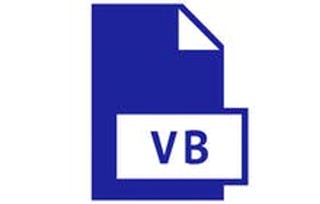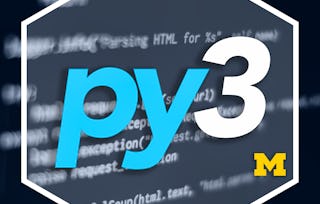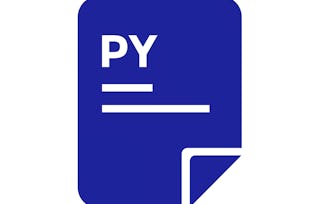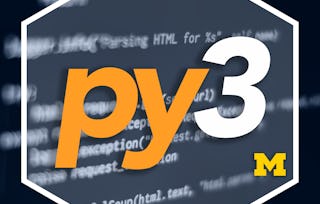This course is the second course in a series that aims to prepare you for a role working as a programmer. In this course, you will be introduced to the four main concepts in programming: Advanced String Operations and Dates, Modeling Classes, Development of Classes and Collections. Labs will allow the students to apply the material in the lectures in simple computer programs designed to re-enforce the material in the lesson.

Python Scripting: Dates, Classes and Collections

Python Scripting: Dates, Classes and Collections
This course is part of Python Scripting for DevOps Specialization

Instructor: LearnQuest Network
3,411 already enrolled
Included with
35 reviews
Recommended experience
What you'll learn
Develop computer programs that utilize classes and objects to solve business and mathematical problems
Skills you'll gain
Details to know

Add to your LinkedIn profile
16 assignments
See how employees at top companies are mastering in-demand skills

Build your subject-matter expertise
- Learn new concepts from industry experts
- Gain a foundational understanding of a subject or tool
- Develop job-relevant skills with hands-on projects
- Earn a shareable career certificate

There are 4 modules in this course
In this module, we continue our adventure coding! We will build on our skills by working with dates and time values. We will expand our abilities by looking at how to work with advance string operations. Lastly, we will explore was to format values for output.
What's included
5 videos3 readings4 assignments2 programming assignments1 discussion prompt
In this module, we continue building out our programming toolset by adding the ability to abstract code and data. We begin to look at how classes are used to store both data and the operations on the data. In this module, we will not program, but we will model the classes in the Unified Modeling Language (UML). UML is a general-purpose, developmental, modeling language in the field of software engineering that is intended to provide a standard way to visualize the design of a system.
What's included
3 videos3 readings4 assignments1 discussion prompt
In this module, we continue looking at abstraction utilizing classes. We will implement parts of the models we developed in the previous module. In this module we will implement the individual classes and one-to-one has-a relationships. In future modules we will implement the one-to-many has-a relationships and is-a relationships.
What's included
4 videos3 readings4 assignments1 programming assignment1 discussion prompt
In this module, we add the ability to store multiple values in a single variable. We look at both low-level arrays and a few higher-level data structures used to store multiple variables. We will utilize the collections to implement classes with the one-to-many has-a relationships we discussed in our previous modeling module.
What's included
4 videos3 readings4 assignments1 programming assignment1 discussion prompt
Earn a career certificate
Add this credential to your LinkedIn profile, resume, or CV. Share it on social media and in your performance review.
Instructor

Offered by
Explore more from Software Development
 Status: Free Trial
Status: Free Trial Status: Free Trial
Status: Free TrialUniversity of Michigan
 Status: Free Trial
Status: Free Trial Status: Free Trial
Status: Free TrialUniversity of Michigan
Why people choose Coursera for their career

Felipe M.

Jennifer J.

Larry W.

Chaitanya A.
Learner reviews
- 5 stars
68.57%
- 4 stars
14.28%
- 3 stars
8.57%
- 2 stars
5.71%
- 1 star
2.85%
Showing 3 of 35
Reviewed on Jul 24, 2021
good course. gets straight to the point on each subject.
Reviewed on Feb 10, 2022
I like the way that the instructor explains the unknons in an understandable approach.

Open new doors with Coursera Plus
Unlimited access to 10,000+ world-class courses, hands-on projects, and job-ready certificate programs - all included in your subscription
Advance your career with an online degree
Earn a degree from world-class universities - 100% online
Join over 3,400 global companies that choose Coursera for Business
Upskill your employees to excel in the digital economy
Frequently asked questions
To access the course materials, assignments and to earn a Certificate, you will need to purchase the Certificate experience when you enroll in a course. You can try a Free Trial instead, or apply for Financial Aid. The course may offer 'Full Course, No Certificate' instead. This option lets you see all course materials, submit required assessments, and get a final grade. This also means that you will not be able to purchase a Certificate experience.
When you enroll in the course, you get access to all of the courses in the Specialization, and you earn a certificate when you complete the work. Your electronic Certificate will be added to your Accomplishments page - from there, you can print your Certificate or add it to your LinkedIn profile.
Yes. In select learning programs, you can apply for financial aid or a scholarship if you can’t afford the enrollment fee. If fin aid or scholarship is available for your learning program selection, you’ll find a link to apply on the description page.
More questions
Financial aid available,

